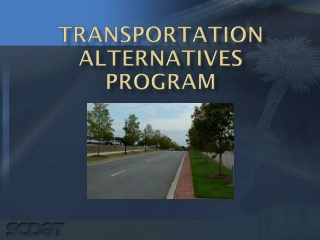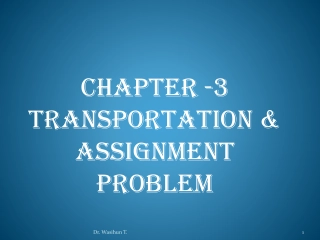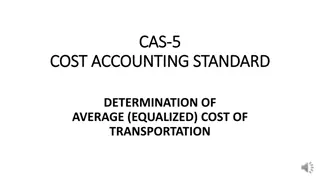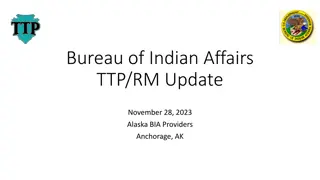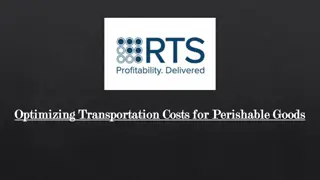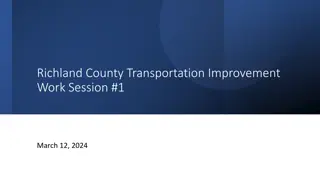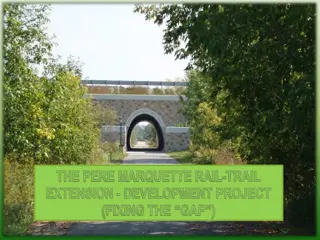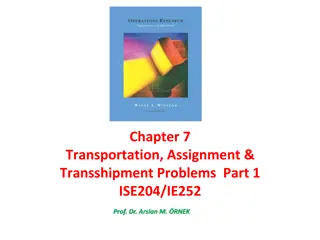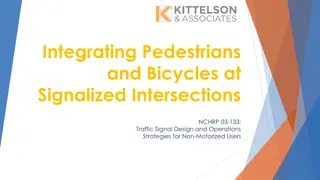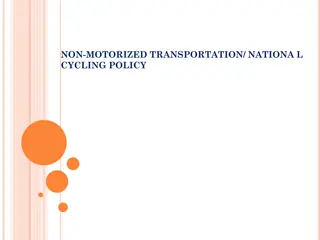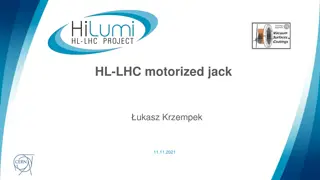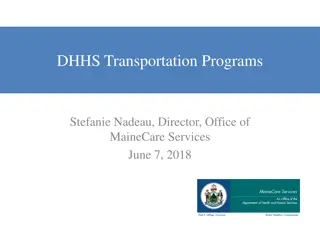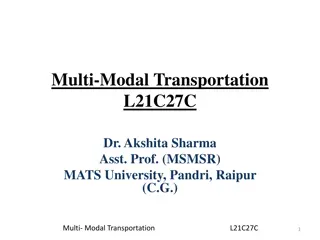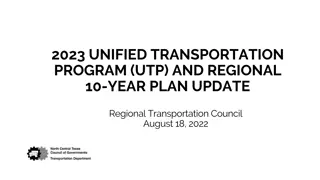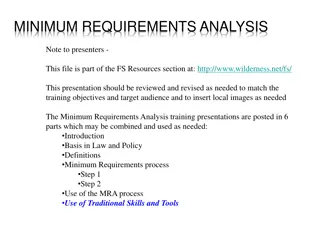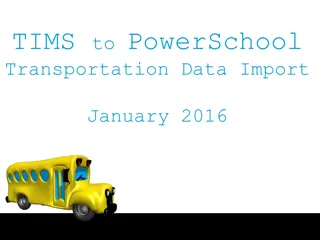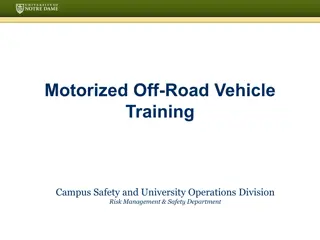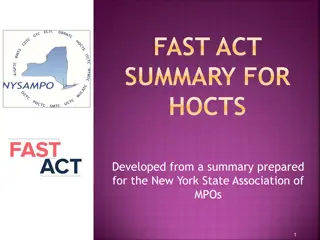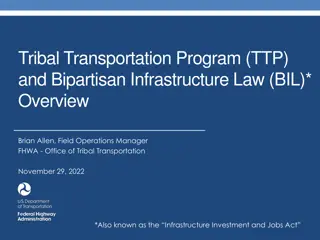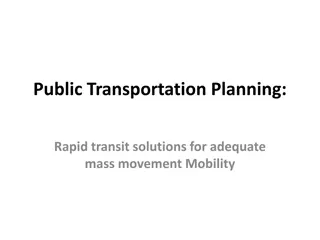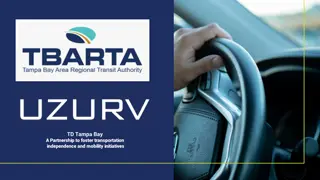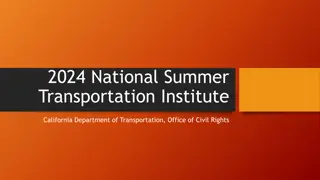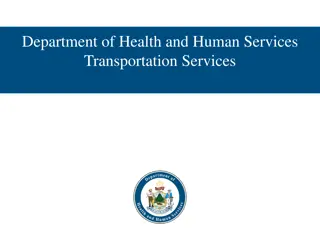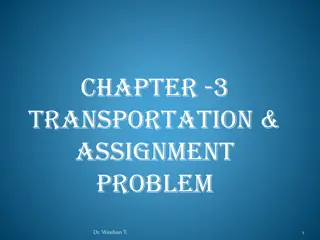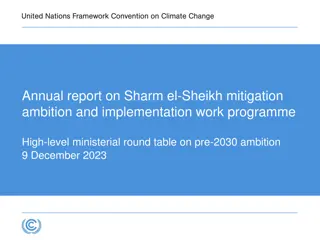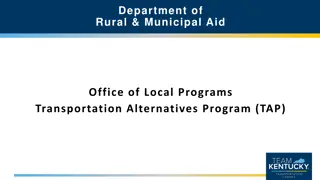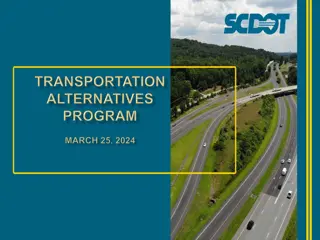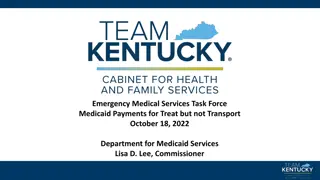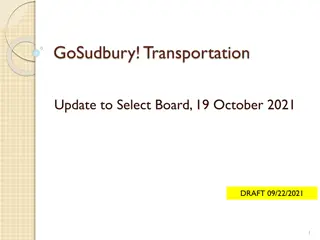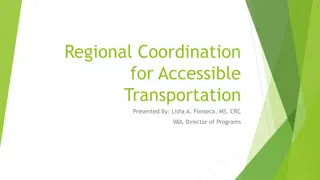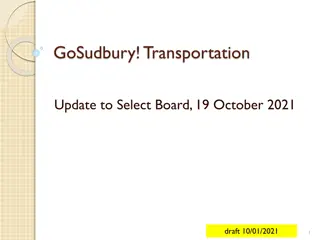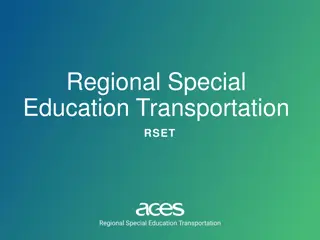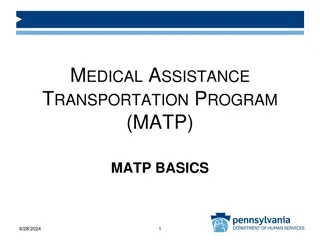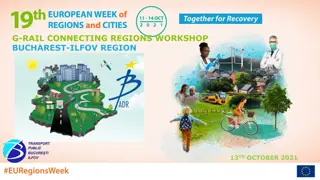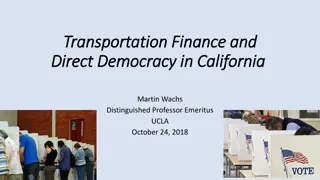Funding Opportunities for Non-Motorized Transportation in South Carolina
The US Department of Transportation's Federal Highway Administration provides funding to South Carolina through the Transportation Alternatives Program (TAP) to support non-motorized transportation initiatives. Local governments, schools, and other entities can partner with the South Carolina Depart
1 views • 21 slides
Transportation & Assignment Problem Overview
The transportation problem involves optimizing shipment costs from multiple sources to multiple destinations with known supply and demand constraints. This chapter discusses the characteristics of transportation problems, key assumptions, and how to formulate the transportation model. Dr. Wasihun T.
0 views • 64 slides
Enhancing Transportation Performance Management through TSMO Collaboration
Advancements in technology and evolving customer needs are driving changes in transportation management. Transportation Systems Management and Operations (TSMO) offers strategies to optimize operational performance, complementing traditional capacity projects. Collaboration between TSMO and Transpor
1 views • 77 slides
Cost Accounting Standards for Determining Transportation Costs
Understanding the importance of transportation costs in procurement and distribution, this guide outlines the standards for determining average costs, separation of transportation costs in accounting records, objectives for maintaining cost uniformity, components of transportation costs, and treatme
0 views • 11 slides
Update on BIA Transportation Programs in Alaska
The update covers the Bureau of Indian Affairs (BIA) Transportation Programs in Alaska, including funding details for the Tribal Transportation Program (TTP) and BIA Road Maintenance Program. It discusses the current funding status, upcoming appropriations, and maintenance activities on BIA-owned ro
0 views • 10 slides
Understanding Transportation Programs and Trends
Transportation training session led by Megan Johnson, featuring topics such as Transportation Crash Course, Training Opportunities, and Transportation Trends & Updates. Includes discussions on different types of transportation services and their importance for communities.
2 views • 38 slides
Optimizing Transportation Costs for Perishable Goods
In the realm of logistics, the transportation of perishable goods presents a unique challenge. From fresh produce to pharmaceuticals, these time-sensitive commodities require specialized handling and efficient transportation to maintain their quality and integrity. One of the critical aspects of man
2 views • 6 slides
Richland County Transportation Improvement Summary
Richland County's transportation improvement work includes sessions on project principles, funding options, project costs, and guidelines for utilizing the transportation penny. The focus is on addressing transportation needs, project prioritization, funding challenges, and division of funds for var
0 views • 19 slides
Closing the Gap: Pere Marquette Rail-Trail Extension Development Project
The Pere Marquette Rail-Trail Extension Development Project aims to bridge the non-motorized gap between the East and West trails in Clare County, creating an 86-mile continuous network connecting Midland and Baldwin. Numerous organizations are involved in this initiative, contributing to the enhanc
1 views • 18 slides
Transportation Problem Modeling in Supply Chain Management
This content discusses the formulation and solution of transportation problems in the context of supply chain management, using a specific example of wheat transportation between grain elevators and mills. It covers the characteristics of transportation problems, linear programming model formulation
3 views • 55 slides
Integrating Pedestrians and Bicycles at Signalized Intersections - NCHRP Report Insights
Explore the comprehensive study on traffic signal design and operations for non-motorized users at signalized intersections. The report dives into the state of practice, research opportunities, industry gaps, knowledge imbalance, challenges, and the need for tailored solutions in varied environments
0 views • 40 slides
Transportation Planning and Data Collection Insights
Understanding transportation planning involves various stages such as data collection, study area definition, and selection of external cordon lines. Collecting data on existing travel patterns, transport facilities, and land use is crucial for formulating effective transportation plans. Defining th
0 views • 27 slides
Non-Motorized Transportation and National Cycling Policy
Introduction to the importance of non-motorized transportation, focusing on walking and cycling as key components in urban and rural settings. Discusses the prevalence of NMT in various countries, challenges faced, and the need for promoting NMT for sustainable transport systems. Highlights the crea
0 views • 13 slides
Design Analysis of HL-LHC Motorized Jack Components
This technical document provides detailed information on the design analysis of various components used in the HL-LHC motorized jack system. It includes boundary conditions, material specifications, strength requirements, and stress analysis of components such as push-pull rings, guide cylinders, RA
1 views • 7 slides
Recreational Trails Program (RTP) FY 2021 Information
The Recreational Trails Program (RTP) for FY 2021 provides grants to assist in acquiring, developing, and improving trail resources. Eligible applicants include local, state, and federal agencies. Maximum grant sizes vary based on the type of trail activities. Applicants must be registered in Sam.go
0 views • 14 slides
Maine DHHS Transportation Programs Overview
The Maine Department of Health and Human Services (DHHS) oversees various transportation programs aimed at providing non-emergency transportation services to low-income, child welfare-eligible, and Section 17-eligible individuals. These programs are managed through regional brokerage systems, with b
3 views • 5 slides
Understanding Multimodal Transportation in Logistics
Multimodal transportation involves using multiple modes of transportation for logistics and freight processes. It utilizes a combination of air, road, rail, water, and package carriers to efficiently move goods. Unlike intermodal shipping, multimodal shipping allows for flexibility in handling cargo
2 views • 119 slides
Regional Transportation Council's 2023 Unified Transportation Program Update
The Regional Transportation Council discussed updates to the 2023 Unified Transportation Program, focusing on Category 2 funding discrepancies, proposed project adjustments, development principles for the 10-Year Plan, and regional funding allocations for 2017-2023 UTPs. The plan emphasizes performa
1 views • 14 slides
Understanding Traditional Skills vs. Motorized Tools in Wilderness Management
Explore the importance of traditional skills and tools versus motorized equipment in wilderness management, highlighting safety, cost, resource impacts, and training considerations. The presentation emphasizes the impact of using motorized tools, the challenges faced, and the assumptions surrounding
0 views • 25 slides
Importing TIMS Transportation Data into PowerSchool
Explore the process of extracting, formatting, purging, and importing TIMS transportation data into PowerSchool for efficient management of student transportation information. This includes creating TIMS extracts, updating bus stop information, and optimizing transportation planning through geocodin
2 views • 43 slides
Campus Motorized Off-Road Vehicle Training Policy
Ensuring safe operation of motorized off-road vehicles (MOVs) on campus property is the primary goal of the University of Notre Dame's policy and training program. Definitions, enforcement measures, and general requirements are outlined to promote responsible usage and uphold safety standards for au
0 views • 24 slides
Overview of FAST Act for Transportation Planning
The FAST Act, passed in 2015, authorizes federal programs for transportation development with a focus on surface transportation. It extends funding through 2020, totaling $304.7 billion. The Act aims to enhance resiliency, reliability, and stormwater mitigation in transportation systems. Planning fa
2 views • 10 slides
Tribal Transportation Program & Bipartisan Infrastructure Law Overview
The Tribal Transportation Program (TTP) and Bipartisan Infrastructure Law (BIL) provide funding for essential transportation projects in Tribal communities. The TTP Bridge Fund, Safety Fund, and High Priority Projects aim to improve infrastructure and safety. The BIL funding for FY22-FY26 totals $3.
1 views • 13 slides
Efficient Public Transportation Planning for Mass Mobility
Rapid transit solutions like high-capacity public transportation systems, including overground rail, underground rail, trams, and BRT systems, play a crucial role in enhancing mass movement efficiency. Factors such as journey time, transport costs, vehicle operating costs, and the benefits of rapid
1 views • 20 slides
TD Tampa Bay - Enhancing Transportation Independence and Mobility Initiatives
TD Tampa Bay partnership aims to increase access to essential services, enhance regional connectivity, and provide on-demand transportation services for transportation disadvantaged individuals in the TBARTA region. The initiative includes innovative solutions like cross-county and evening/weekend t
1 views • 9 slides
National Summer Transportation Institute (NSTI) Program Overview
The National Summer Transportation Institute (NSTI) program, established by the Federal Highway Administration and Department of Transportation, aims to increase student interest in transportation careers and STEM fields. It offers a 2-4 week immersive experience at accredited colleges, focusing on
2 views • 18 slides
DHHS Coordination of Transportation Service Contracts Overview
The Department of Health and Human Services in Maine conducted an assessment of Transportation Services in June 2019. The workgroup identified three main priorities: alignment of Quality and Performance Measures, Safety Measures, and Evaluation of Transportation Services. The first priority involves
0 views • 28 slides
Understanding Transportation and Assignment Problem
Transportation and assignment problems involve optimizing the shipment of goods from various sources to multiple destinations while minimizing total transportation costs. These problems deal with limited supply, known demand, constant shipping costs, and integer quantities. The transportation algori
0 views • 64 slides
Sharm el-Sheikh Annual Report on Mitigation Ambition and Implementation
The annual report on the Sharm el-Sheikh mitigation ambition and implementation work programme highlights the mandate to urgently scale up mitigation efforts in the critical decade ahead. Global dialogues and investment-focused events aim to drive ambition and implementation, focusing on acceleratin
0 views • 12 slides
Rural and Municipal Aid Transportation Alternatives Program Overview
The Department of Rural & Municipal Aid oversees the Transportation Alternatives Program (TAP), which funds various transportation projects across different population areas. The program has specific funding categories, eligibility requirements, eligible and ineligible activities. The emphasis is on
0 views • 11 slides
Enhancing Transportation Infrastructure Through Federal Funding Programs
The Transportation Alternatives Program (TAP) funded by the USDOT's Federal Highway Administration supports transportation projects in South Carolina based on population categories. TAP funds are allocated to Transportation Management Areas (TMAs), Small Urban Areas, and Non-Urban Areas, prioritizin
0 views • 21 slides
Kentucky Medicaid: Ambulance Services Coverage Overview
Kentucky Medicaid provides coverage for ambulance services including ground or air transportation at different levels of care, documentation requirements, and conditions for non-emergency transportation within and outside the medical service area. The program also outlines provisions for non-emergen
0 views • 16 slides
Addressing Transportation Gaps in Sudbury: A Livable Community Approach
The Sudbury Transportation Committee, established by the Select Board, aims to enhance transportation in Sudbury to create a livable community. Focusing on inclusivity, equity, and addressing transportation gaps impacting various aspects of livability, the initiative seeks to improve social particip
0 views • 16 slides
Understanding Regional Coordination for Accessible Transportation
This presentation delves into the concept of regional coordination in accessible transportation, focusing on the Regional Transportation Advisory Panel, 5-year regional transportation goals, and the significance of the Safe, Accountable, Flexible, Efficient Transportation Equity Act. It emphasizes t
0 views • 16 slides
Enhancing Livability in Sudbury Through Transportation Initiatives
The GoSudbury! Transportation Update to the Select Board on October 19, 2021 highlights the importance of addressing transportation as a key component of livable communities. The initiative aims to create a safe, secure, and inclusive environment by improving transportation options for residents of
0 views • 26 slides
Regional Special Education Transportation (RSET) Program Overview
RSET, which stands for Regional Special Education Transportation, is an initiative developed by ACES to help districts save money while safely transporting students to out-of-district placement sites. The program benefits districts by reducing transportation costs, addressing parent concerns, and ma
0 views • 13 slides
Understanding Pennsylvania's Medical Assistance Transportation Program (MATP)
The Medical Assistance Transportation Program (MATP) in Pennsylvania provides essential transportation services to access medical care. Governed by state plans and codes, MATP aims to offer access to medical, pharmacy services, chronic disease management, and preventative care. Transportation provid
0 views • 16 slides
Bucharest-Ilfov Regional Development Insights
Bucharest-Ilfov Region, a significant economic hub in Romania, faces challenges of poverty, high rail density, and youth unemployment. Initiatives like the Regional Operational Program have led to job creation, road modernization, and energy efficiency improvements. Investments in sustainable urban
0 views • 11 slides
Transportation Finance and Direct Democracy in California
Proposition 6 on November 6th has garnered attention, but voters in multiple states will decide on over 250 transportation ballot measures totaling over $55 billion. California, with a longer history and greater funding needs, has been at the forefront of transportation investments, including the us
0 views • 29 slides
Perfect Motorized Stroller
The motorized stroller redefines convenience for parents, featuring an electric-powered system that helps with pushing and maneuvering. Ideal for longer walks or uneven terrain, it eases the strain on caregivers while ensuring a smooth ride for littl
2 views • 6 slides
